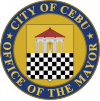Miguel Raffiñan
Miguel Raffiñan | |
|---|---|
 | |
| Member of the House of Representatives for Cebu's 6th District | |
| In office 1916–1922 | |
| Preceded by | Vicente Lozada |
| Succeeded by | Nicolas Rafols |
| In office 1931–1934 | |
| Preceded by | Nicolas Rafols |
| Succeeded by | Nicolas Rafols |
| In office 1939–1941 | |
| Preceded by | Nicolas Rafols |
| Succeeded by | Nicolas Rafols |
| Mayor of Cebu City | |
| In office 1947–1951 | |
| Preceded by | Luis Espina |
| Succeeded by | Pedro Bernal Elizalde |
| Personal details | |
| Born | May 13, 1891 |
| Nationality | Filipino |
| Alma mater | University of San Carlos |
| Profession | Lawyer |
Miguel Garces Raffiñan (born May 13, 1891, date of death unknown) was a Filipino Visayan lawyer, politician and mayor from Cebu, Philippines. He was mayor of Cebu City (1947–1951) and Congressman of Cebu's 6th District (1916–1922, 1931–1934, 1939–1941).
Early life
Miguel Raffiñan, son of Filomeno Raffiñan and Honorata Garces,[1] was born on May 13, 1891.[2] He attended University of San Carlos and acquired a bachelor's degree[1] and became a lawyer on October 2, 1917. He married Visitacion Paras Abad of Barili, Cebu.[3]
Career
Journalism
He wrote for the Spanish dailies El Precursor, a newspaper founded by Mariano Jesus Cuenco, and La Revolucion, a daily founded by Filemon Sotto.[3]
Congressman
He was elected Congressman for Cebu's old 6th district in the 4th Philippine Legislature in 1916 and reelected again in 5th Philippine Legislature in 1919 and served until 1922. In 1931, he ran and won again as representative in the same congressional district in the 9th Philippine Legislature and won again in 1939 elections where he served in the 2nd National Assembly until 1941.[4] The 6th congressional district then was composed of the towns of Aloguinsan, Barili, Dumanjug, Pinamungajan, Toledo, and Ronda.[3]
World War II
Raffiñan participated in the resistance movement during World War II and led the people of Barili in the fight against the Japanese colonizers. The guerilla force in Barili was formed by Lieutenant Aguasin and Domingo Gutang on September 27, 1942.[3]
Mayor
On September 6, 1947, he became mayor of Cebu City[2] until 1951, succeeding Dr. Luis Espina.
During his term, he was responsible in the repair and reconstruction of the four-story, colonnaded Cebu City Hall with War Damage Funds.[5] Additionally, the first radio telephone circuit established between Manila and Cebu was inaugurated on March 1, 1950, under the term of then President Elpidio Quirino, with the first official three-minute conversation between then former President Sergio Osmeña and Raffiñan.[6]
In 1947, the city council passed an ordinance exacting fees on each ticket sold in local theaters. Theater owners filed a complaint against the city in court with Raffiñan, then city treasurer Anatolio Ynclino, and acting city treasurer Jesus E. Zabate as respondents. On February 18, 1956, the Supreme Court ruled that the city did not have the power to enforce the ordinance and denied the demand of plaintiffs to recover the fees that were already collected.[7]
Raffiñan would later be replaced by Pedro Elizalde as mayor.[2][8]
Legal practice
As a lawyer, he represented the Sampaguita Shoe and Slipper Factory in a suit against the Bureau of Customs and the Court of Tax Appeals that was decided by the Supreme Court.[3]
Historical commemoration
- Previously known as San Jose Street, the Miguel Raffiñan Street in Cebu City was named in his honor by virtue of City Ordinance No. 553 enacted on August 26, 1965.[3]
References
- ^ a b The Commercial & Industrial Manual of the Philippines . Publishers incorporated. 1938.
- ^ a b c Mojares, Resil B. "Today in the History of Cebu" (PDF). www.library.usc.edu.ph. University of San Carlos. Retrieved May 23, 2019.
- ^ a b c d e f Oaminal, Clarence Paul (April 28, 2014). "Miguel Raffiñan Street, Cebu City". The Freeman through Pressreader. Retrieved May 23, 2019.
- ^ "ROSTER OF PHILIPPINE LEGISLATORS". www.congress.gov.ph. House of Representatives; Republic of the Philippines. Retrieved May 23, 2019.
- ^ "Gabiisakabilin2014 eguide". Issuu. Ramon Aboitiz Foundation Inc. Retrieved 2019-05-23.
- ^ "Official Month in Review: March 1950 | GOVPH". Official Gazette of the Republic of the Philippines. Retrieved 2019-05-23.
- ^ "G.R. No. L-4887". lawphil.net. Retrieved 2019-05-23.
- ^ Oaminal, Clarence Paul (February 22, 2019). "The first election for Cebu City mayor". philstar.com. Retrieved 2019-05-23.


